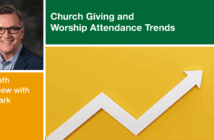Churches often see their circumstance through the lens of scarcity and fail to recognize assets and opportunities within their grasp. Joe Daniels and Christie Latona explain how adopting a mindset of abundance can reveal overlooked assets and open new possibilities.
Jesus taught his disciples — and teaches us — to assume that there’s always a fish sandwich in the crowd. There’s always an unknown asset that can meet someone’s need and resolve someone else’s problem, that can connect people for a change and bring hope to people in despair.
Oftentimes all the ministry assets we need are right under our noses, but we fail to appreciate their fragrance. We can be looking at these assets for years and never see their true value. An asset becomes an asset when we view it as such and when we allow it to be all that it can be.
A mindset of scarcity
Getting rid of a scarcity mentality can be a challenge for many. This type of mentality consistently focuses on what we don’t have (versus what we do have) and makes it very difficult to see things and people as assets. This “lens of scarcity” colors everything and can lead to hopelessness, fear, defeat, desperation, and depression.
Furthermore, a scarcity mentality pours cold water on divine vision and deflates transformational hopes and dreams. Scarcity mentality also prevents holy collaboration as it drives people to compete as if there is only a little piece of the pie available to us. Yes, resources can be limited in many situations, but what defeats us more than anything is having a mindset that is limited — a mindset that does not see that little can become much when we put it in the Master’s hands.
A mindset of abundance
An abundance mentality, however, sees that all things are possible with God. This mentality recites over and over again that eyes have not seen, and ears have not heard, and neither has it entered into the hearts of men and women the great things God will do for those who love God. This mentality is in the hearts of people who dream big dreams and see massive visions and are not afraid to chase after them regardless of the many costs that are involved.
While an abundance mentality comes naturally for some, for others it can be learned. None of us has to walk around stuck in a scarcity mindset.
It’s important to say here that abundance thinking is different from a prosperity gospel. Abundance thinking helps to put prosperity in a proper perspective. Prosperity literally means to “help another along the way.” When we help others along the way, we aren’t just helping others; we’re living into our shared divine purpose. Like the good Samaritan, we demonstrate loving our neighbors in concrete ways and, by doing so, experience a form of worship. Living with an abundance mindset says there’s enough out here for everybody, and if we do it God’s way, there’s more than enough for everybody.
New possibilities
When leaders live with an abundance mindset, their congregations are better at recognizing and utilizing their assets. We worked with an African American congregation that found itself surrounded by a wealthy, white community. There had been a time when the neighborhood was entirely African American. As happens in many cities, the last thing to change in the neighborhood was the church. And this church found itself as no exception.
While other African American congregations in the neighborhood left and became strong, or stayed and died, this congregation stayed and sought to remain vital to the neighborhood. To survive and thrive, however, the people in the congregation had to decide what sort of attitude to adopt, now that their neighbors didn’t look like them and their parking spaces had disappeared. Would they mope and complain? Or would they examine their assets and do something with them? They decided to do the latter.
This church discovered that one of their hidden assets was the people on the street who were homeless. To help this population, the church raised money to renovate its kitchen and to turn the fellowship hall into a place where those who are homeless are fed on a regular basis. In spite of its painful racial past, the church decided to reach out to people in the community who didn’t look like them to ask them to join the church in serving. And the church began to partner with other churches in their community to share in this ministry of feeding the homeless.
One of those partners was another United Methodist church in the neighborhood. These two churches had a divisive history; the black church members separated from the white church members because of racial discrimination. Through partnering to meet a common need in the community, the two churches began reconciling old wounds, repenting from past actions and behaviors, and moving forward with one accord.
Through each of these actions, what appeared to be a hopeless situation for a declining congregation became a ray of hope and holy imagination for what God can do and what can be when we uncover the unknown.
This material is excerpted from Connecting for a Change: How to Engage People, Churches, and Partners to Inspire Hope in Your Community (Abingdon Press, 2019) by Joe Daniels and Christie Latona. Used by permission. The book is available at Cokesbury and Amazon.
Related Resources
- Leading Ideas Talks Podcast Episode 34: “It’s All about the Building” featuring Bob Jaeger
- Using Your Building Assets by Rosario Picardo
- Some Old Handbells Became Our Fish and Loaves by Rosario Picardo
- What is “Adjacent Possible”? Can It Benefit Your Church? by Lovett H. Weems, Jr.






